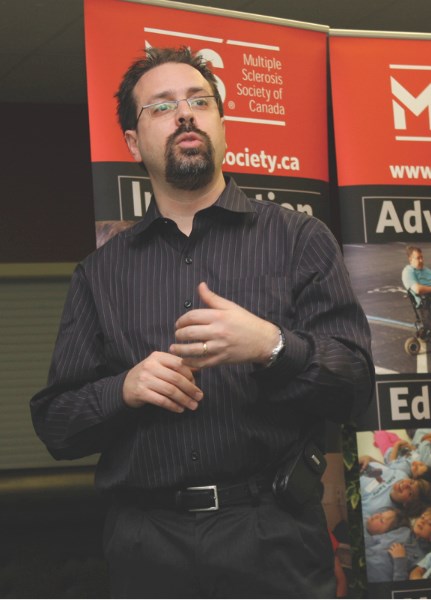Edmonton neurologist Dr. Ken Makus was in town for Bonnyville's MS Awareness Day, and addressed a group of about 30 people at an MS information session Sept. 30.
Makus, who specializes in treating MS and epilepsy, discussed different kinds of treatment, new research and drugs, and answered peoples' questions.
He discussed how some patients have been opting to go to other countries for surgeries not approved yet in Canada. Makus has told his patients that if they chose to do this, he will see them both before and after. But he says there can be credibility issues with hospitals in other countries.
He said he wishes the government would allow neurologists to make decisions about whether certain drugs should be used to treat MS patients.
He discussed stem cell therapy and the notion of erasing a patient's immune system and restarting it, an idea he called both "interesting" and "dangerous." Makus discussed a study on animals that suggests the brain might be able to heal itself. There has been quite a bit of progress in calming down MS, he said, but he hopes to see progress in researching ways to get the human brain to repair MS-related damage. He said the scientific community used to believe it was not possible, but that now it could be.
Makus also discussed the importance of treating MS symptoms such as an overactive bladder and fatigue.
"At the end of the day, if (a person's MS is stabilized but they) can't leave the house because of bladder issues, how have we helped them?"
Makus also discussed Dr. Paolo Zamboni's study on Chronic Cerebrospinal Venous Insufficiency (CCSVI) that suggests because "compensatory blood vessels don't have the same wall integrity as larger veins, they tend to leak blood into the adjacent tissue, depositing iron there which triggers an immune response," according to the MS Society of Canada's website.
Makus called it a "good preliminary study," adding that CCSVI trials are ongoing.
He recommends MS patients eat cranberries, polyunsaturated fatty acids, Vitamin D, and get exercise. "Even stretches can make a difference" to make a patient more comfortable, he said.
Makus also debunked some myths such as the notion that science is a progressive accumulation of new facts. He said sometimes there are revolutions in science, but often science builds on previous information. He also explained how disputes between scientists are good, as both scientists and their theories need to be critiqued.
He said that science can't offer all the solutions and that communities need to come together, the way they encouraged the government for funding in the 90s.
"Sometimes all it takes is one discovery," he said. "Just because science hasn't figured out something, doesn't mean it's not there."
Last month, the MS Society of Canada set aside $1 million for a CCSVI and pan-Canadian therapeutic clinical trial.



